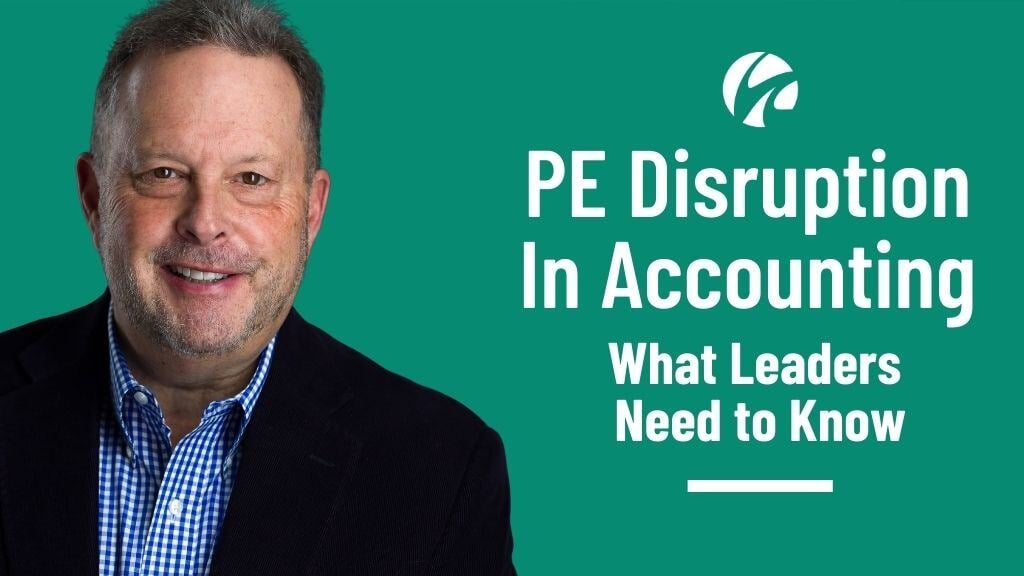4 min read
PE Investments Into Accounting Firms: Is History Repeating Itself?
Reprinted with permission from Accounting Today. In recent months, we have seen much written about the growing involvement of private equity firms...
4 min read
by:
.jpg) Gary Shamis and David Toth
on
Mar 02, 2023
Gary Shamis and David Toth
on
Mar 02, 2023
.jpg?width=300&height=300&name=Gary%20Shamis%20and%20David%20Toth%20(1).jpg)
Table of Contents
This article is an overview of a panel discussion at Winning Ways, the accounting profession’s only conference on practice management.

Recent months have seen an influx of private equity (PE) investment into the accounting industry. In 2022, several PE deals made headlines, with leading firms including EisnerAmper, Citrin Cooperman, and Cherry Bekaert all receiving significant investments from private equity firms.
It appears that many PE firms increasingly view accounting firms as attractive investment targets. With this growing momentum, many accounting firm leaders are actively reconsidering their firm’s growth strategy. But as of today, we’re still in the early innings. While PE firms continue to make investments, it’s impossible to predict how they’ll perform, both for investors and accounting firms, over the long term.
PE investment is not necessarily a good fit for the majority of accounting firms. For a deal to work for all parties, a lot of facts have to hold true. In this overview, we’re exploring the key considerations that both firm leaders need to be aware of when considering a potential investment.
PE firms tend to have aggressive growth goals for their portfolio companies that are significantly different from the standard growth targets an accounting firm may set for itself.
Traditionally, private equity firms have a 4 – 7 year time horizon for their assets, although some can hold for 10 or even 15 years. At the end of this hold period, the PE firm aims to exit its investment at a significant return, either through taking the firm public or selling its ownership interest to another entity.
During this holding period, the PE firm will have ambitious growth targets for your accounting firm. In many cases, investors might want to double or triple revenue and demonstrate clear EBITDA – a number that thanks to the traditional partnership structure, is currently $0 in many accounting firms.
There’s no question that achieving this growth is extremely challenging for accounting firms that are accustomed to growing incrementally each year. One key fact to bear in mind is that it’s near-impossible to achieve this growth organically. To deliver the outsized returns PE investors expect, firms almost certainly will have to acquire new strategic assets, incorporate them into their existing business, and scale them orders of magnitude: all within a few years.
It’s also important to note that the majority of PE firms are only interested in firms that have already reached a certain critical mass. Currently, the primary targets for PE investors are the top 400 or so firms, although smaller firms may become acquisition targets for larger firms that have already received PE funding.
A lot of firm leaders have contemplated PE investments; many may have already had initial conversations with PE firms. In fact, it’s safe to assume almost every firm in the top 400 has received some kind of interest. Throughout this process, there are several considerations that leaders should keep in mind.
The first is that as an accounting firm, you have power in this situation. Accounting firms are people businesses. If an outsider wants to invest, they need to do so on friendly terms for their strategy to work. That affords firms the power to shop around and partner with investors that represent the best fit for their business.
Another important consideration is the makeup of your firm. For partners close to retirement, a PE investment is a home run, turning ordinary income into capital gains. For rising partners who might still be decades away from retirement, a PE investment can be a huge risk. In effect, you’re asking younger partners to forgo a large portion of their compensation for a reward that’s entirely uncertain. This can cause tension between retiring partners and rising partners, creating a delicate issue for leaders to navigate.
It’s also vital to consider how well-placed your firm is to benefit from a PE investment. Being able to demonstrate a clear and tangible growth plan is central to receiving investment, but the mechanics of that are far from easy. Your firm might have to acquire smaller firms in tertiary markets, invest in building out advisory practices, and aggressively recruit new employees when the industry is already in a talent crunch.
These are just a few of the issues that partners have to contend with as they build the vision for the future of their firms. But if you do decide to go down the private equity route, how can you find a partner that’s a good fit for your firm?
In the same way that no two accounting firms are the same, no two private equity firms are the same. That’s why it’s important to vet potential investors before exploring any deals. There are a few factors to consider:
In evaluating potential partners, it’s best to be highly selective. Seek guidance from experienced leaders who have navigated similar experiences in the past and use their insights to shape your approach.
For the most part, the accounting industry is resistant to change. Our profession is a risk-averse one that tends to be happy with the status quo, particularly when the status quo is good, which it has been in recent years.
However, the industry is changing rapidly in a way that leaders cannot afford to ignore. The influx of private equity funding into the accounting industry is prompting many firms to reconsider their long-term growth strategies.
Throughout that process, many firms benefit from additional guidance and strategic support: areas that the team at Winding River Consulting specializes in.
Whether you’re considering pursuing PE funding or need to redefine your firm’s overall strategy, our team is here to help. We exclusively work with accounting firms and have a team of proven industry leaders dedicated to helping your firm build a more prosperous future. To learn more about working with us, contact us today.

4 min read
Reprinted with permission from Accounting Today. In recent months, we have seen much written about the growing involvement of private equity firms...

Private equity is transforming the accounting industry, reshaping mergers and acquisitions, and presenting both challenges and opportunities for...

Is independence still a viable path for accounting firms, or is private equity inevitable? In this insightful conversation, Gary Shamis, founder of...